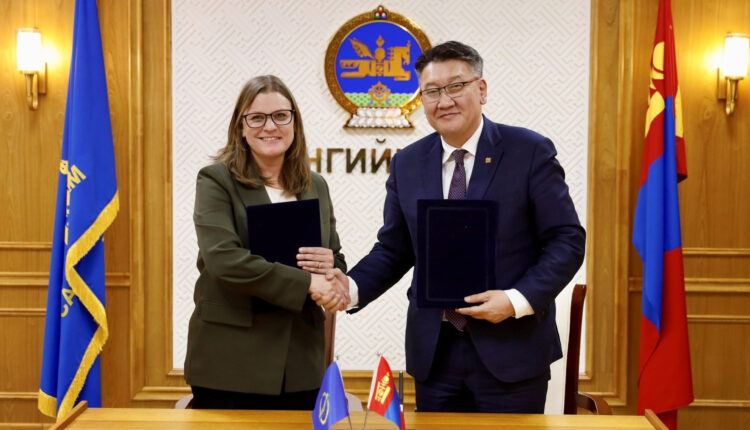ULAANBAATAR — The Government of Mongolia and the Asian Development Bank (ADB) today signed loan and grant agreements totaling $168.2 million for the first tranche of an investment program to support green and inclusive development of Mongolia’s aimags (provinces) and soums (subprovinces). ADB Country Director for Mongolia Shannon Cowlin and Minister of Finance Javkhlan Bold signed the agreements.
“The program will promote a transformative model for green territorial development and green urban–rural linkages,” said ADB Country Director for Mongolia Shannon Cowlin. “Aimag and soum centers will become anchors of climate-smart agribusinesses that promote sustainable, resilient, and low-carbon rangeland management.”
Mongolia’s rangelands, which cover 82% of the country, are threatened due to livestock pressure on pastureland and unsustainable rangeland management practices. Climate change has reduced the productivity of fragile rangelands and has increasingly exposed herders to climate-related hazards.
With an initial focus on western aimags, the Aimags and Soums Green Regional Development Investment Program will implement climate-resilient, high-carbon sequestration, and sustainable rangeland management to support and empower herder groups. It will promote renewable energy and low-carbon solutions through urban services, and build livable aimag and soum centers as anchors for a green agribusiness value chain.
To expand financial access for low-carbon and climate-resilient agribusiness value chains, the project will establish a green and inclusive regional agribusiness fund to provide climate-smart financial mechanisms and institutions to overcome the financial bottlenecks of agribusiness small and medium-sized enterprises.
The total program cost is $735 million, which will be financed by ADB, the European Investment Bank, European Union, and the Green Climate Fund—with counterpart financing from the Government of Mongolia and the private sector. ADB financing includes a $3 million grant from the Asian Development Fund (ADF), which provides grants to ADB’s poorest and most vulnerable developing member countries. The project will be implemented in three stages (tranches) and is expected to be completed in 2033.
ADB is committed to achieving a prosperous, inclusive, resilient, and sustainable Asia and the Pacific, while sustaining its efforts to eradicate extreme poverty. Established in 1966, it is owned by 68 members—49 from the region.


Comments are closed.